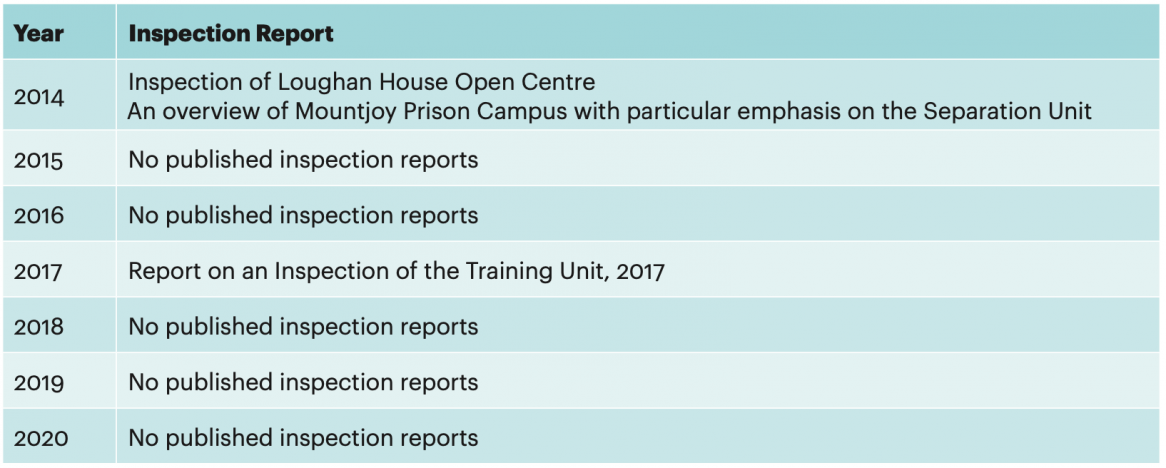Current context:
Inspection and monitoring is vital to the protection of human rights of prisoners. A number of factors can increase the vulnerability to breaches in human rights of people held in a prison environment:
“The protection of human rights in prison gives rise to unique challenges. The power differentials and dynamics involved, the need to balance considerations of security with those of dignity, and the lack of openness to the outside world mean that the implementation of human rights principles takes on a particular importance in these environments. International human rights law has increasingly emphasized the importance of external oversight of prisons as a way to prevent torture and ill-treatment and to uphold fundamental rights more generally.”[447]
New research by Prisons: the Rule of Law, Accountability and Rights (PRILA) has found evidence of a lack of awareness and deficit of trust among the prison population in Ireland towards prison monitoring.[448] Qualitative research conducted in three prisons found that prisoners were largely unaware of the Inspector of Prisons. Despite this, prisoners viewed the concept of monitoring as a good way to protect rights. The visibility of monitors, clarity in their roles and powers, and ensuring that a variety of voices are heard by monitoring bodies are important elements of a good system of prison oversight.[449] Key aspects of good prison monitoring as perceived by prisoners included: access (to all parts of the prison including the yard or landing), visibility, and confidentiality – particularly in the context of making a complaint. Key recommendations from the research are:
- Inspection and monitoring bodies should consult with prisoners on what is important from their perspective for human rights standards and the protocols of monitoring bodies
- The freedom of a body to walk around without any limitations is valued by prisoners
- Further research into the experience of particular categories of prisoners, including women, older people and people with disabilities, of prison inspection and monitoring would be valuable
Ratification of the Optional Protocol to the Convention against Torture (OPCAT)
The State has failed to ratify the OPCAT and there has been no establishment of a National Preventive Mechanism. Almost all EU Member States have signed and ratified the OPCAT with the exception of Ireland, Belgium and Slovakia who have signed but not ratified, and Latvia.[450] For the third year in a row, the Department of Justice and Equality has stated that the General Scheme of the legislation required is expected to be ready for formal drafting before the end of the year.[451]
The 2020 Programme for Government commits to the ratification and implementation of OPCAT within 18 months of the formation of government. This is welcome. However, if Ireland had ratified OPCAT prior to the pandemic, it may have supported stronger oversight during the Covid-19 pandemic for all people deprived of their liberty. In New Zealand, for example, the work of the Chief Ombudsman was described by the Secretary of Justice as an ‘essential service’ during Covid-19. A report on prisons and recommendations by the Ombudsman were accepted by the Ministry for Justice in New Zealand,[452] and a Statement of Principles was created by the Ombudsman to guide staff in managing the Covid-19 crisis.[453]
Office of the Inspector of Prisons
IPRT welcomes the additional resourcing of the Office of the Inspector of Prisons in 2020, including recruitment of three additional positions: a Data Analyst, Inspector and Senior Inspector.[454] The Office launched its new Framework for the Inspection of Prisons in Ireland in September 2020.[455] IPRT welcomes the framework, which is informed by international human rights standards. There are five focus areas of inspection including: safety and security, respect and dignity, health and wellbeing, rehabilitation and development, and resettlement. In particular, IPRT welcomes the Office’s commitment to engage with both prisoners and staff through surveys and interviews.[456] This is particularly important given the findings of the PRILA research.
During the Covid-19 pandemic, the Inspector of Prisons continued visiting prisons. All prisons received a one-day visit with specific emphasis on out-of-cell time and provision of meaningful contact.[457] However, the complete absence of published inspection reports means the public has very little knowledge of how prisons have operated during the pandemic. This was an issue prior to the pandemic. The last prison inspection report was published in 2017.[458] Since 2008, there has been no published prison inspection report of Cloverhill, Cork, Midlands, Portlaoise or Wheatfield prisons.[459]

In addition, no annual report for 2019 has been submitted despite the requirement in laws that the Inspector should submit a report by 31 March.[460]
Prison Visiting Committees
There has been no change to the structure of prison visiting committees in Ireland. IPRT welcomes a commitment in the Programme for Government to: “Review the existing functions, powers, appointment procedures and reporting processes for prison visiting committees.”[461] (For more on the role of prison visiting committees in the complaints process, see Standard 22.)
The Minister for Justice published annual prison visiting committee reports for 2018 on 25 May 2020.[462] When the publication of reports is substantially delayed, it renders the reports as less relevant as they do not reflect the current daily life of people in prisons in Ireland.
Progressive Practice:
Progressive Practice: Publication of Short Scrutiny Visits
Short Scrutiny Visits by HM Inspectorate of Prisons in England and Wales were undertaken and published during the Covid-19 pandemic. These reports were published in a timely manner and provided a description of the harsh conditions prisoners were exposed to. Prisoners were held in their cells for 22.5 hours for a three-month period. The Inspectorates found staff punishing behaviour by withdrawing an individual’s access to a shower for a day or more. The report also found that there was little evidence of the relaxation of restricted regimes in tandem with the community and highlighted:
“There was an obvious need to engage prisoners once again in some meaningful activity out of their cells. So far there has been a degree of understanding and goodwill on the part of most prisoners, but there is growing evidence that this is now being severely tested.”[464]
The findings and publication of these reports are particularly important to ensure oversight of prison systems during a pandemic.
Independent Monitoring Boards (IMB), England
During the Covid-19 pandemic, IMBs continued to operate, albeit remotely and through a Freephone line. A key issue raised in the 2019/2020 annual report published during Covid-19 was healthcare, specifically the inability to access treatment and medication. As highlighted in the report itself:
“The importance of independent monitoring during such exceptional times was shown when boards’ monitoring or the freephone applications line revealed unpublicised or questionable practices.”[465]
These monitoring reports also allowed for further insight into prison conditions in England and Wales, and highlighted:
“Moving from a culture of containment back towards one of rehabilitation and purposeful activity, and ensuring prisoners’ wellbeing while continuing to control infection, will be both essential and demanding. Boards will continue to monitor this closely, both in terms of the pace and the direction of travel.”[466]
This is particularly important given the evolving situation and state of uncertainty that Covid-19 has brought.
Actions required:
Status of Standard 24: Mixed
Rationale for Assessment
There has been no significant change to prison oversight and inspection over 2019/2020, with no inspection reports published. While additional resourcing of the Office of the Inspector of Prisons; the publications of the Framework for Inspection of Prisons; and commitments to reform prison visiting committees, and ratification of OPCAT in the Programme for Government are all welcome, the lack of inspection and oversight leaves the human rights of people in our prison system highly exposed. This is especially acute during a time of a national and global emergency. Only through a rigorous inspection and monitoring regime, along with an independent complaints mechanism, can the rights of people in prison be safeguarded. Where prisoners have no access to independent redress, this fundamentally weakens access to their rights, undermines trust and creates tension within the prison.
| Action 24.1: |
Government must meet its stated timeline and ratify OPCAT by end 2021.
|
|---|
| Action 24.2: |
Legislators should strengthen the powers of the Office of the Inspector of Prisons to publish inspection reports directly, and remove the powers of redaction of prison inspection reports from the Minister for Justice.
|
|---|
| Action 24.3: |
Inspection and monitoring reports during the Covid-19 pandemic should be compiled by the Office of Inspector of Prisons and by prison visiting committees and and published by the Minister for Justice within one month of submission.
|
|---|
| Action 24.4: |
The Department of Justice should commence consultations on the reformation of prison visiting committees.
|
|---|


